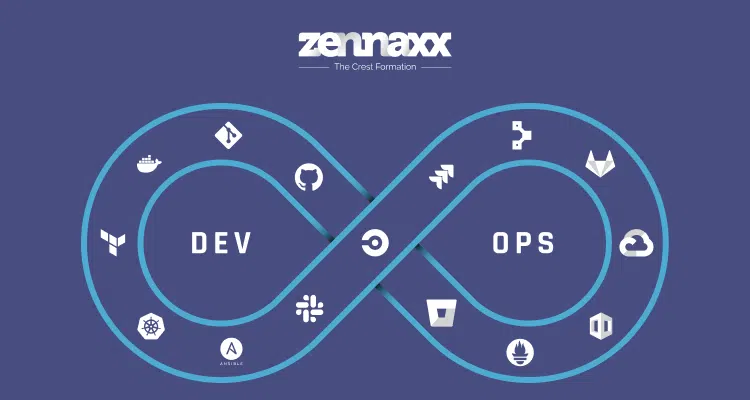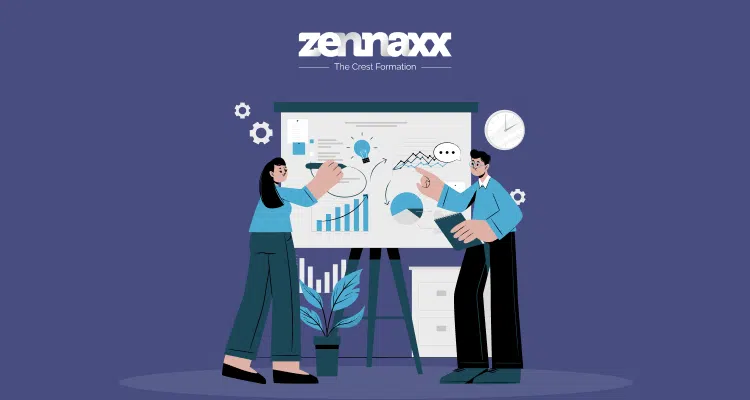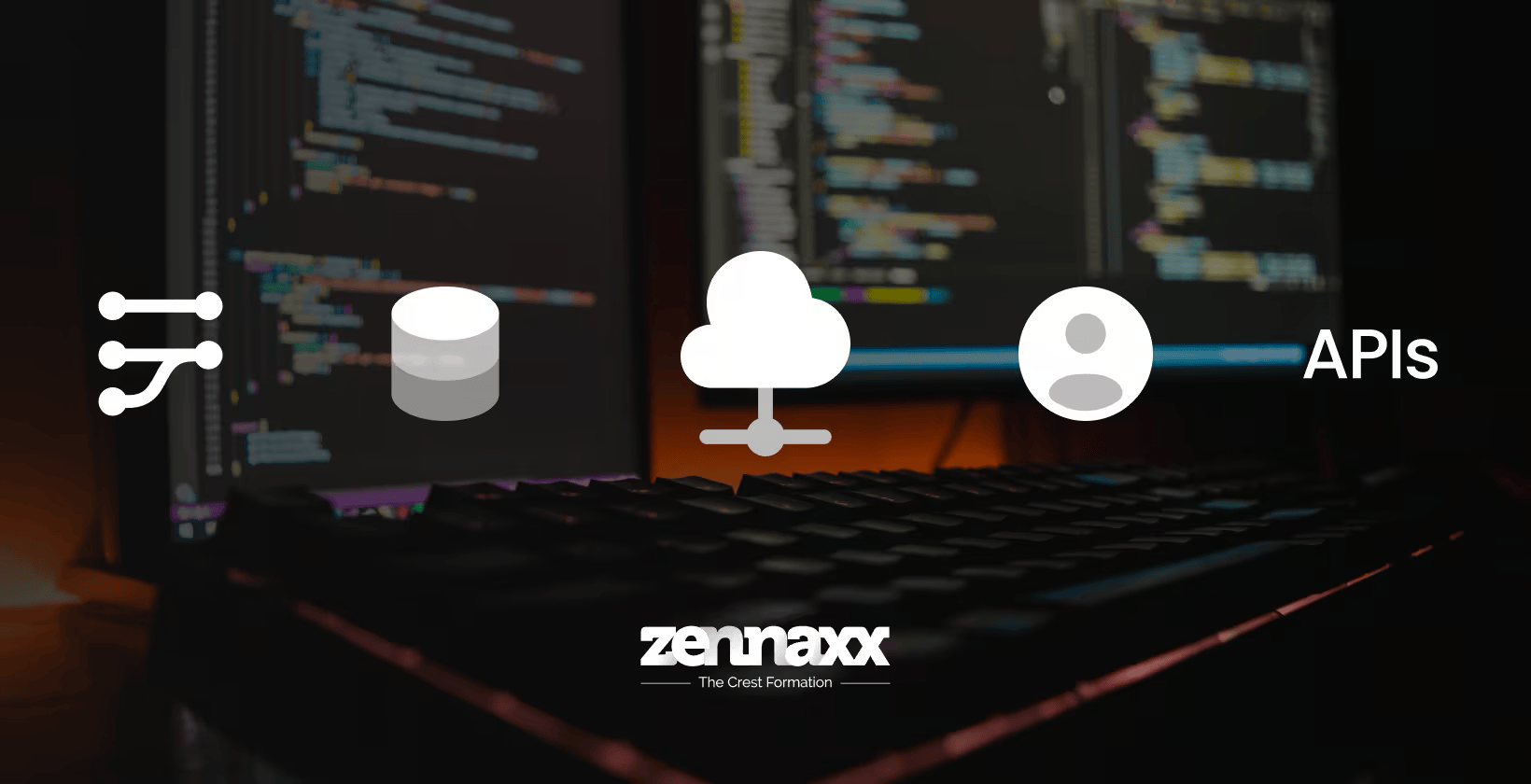DevOps is a concept that merges the development (dev) and operations (ops) parts, being a hit or a miss depends on the organization as a whole, and it is not just the use of the right tools or Team spirit that matters.
The interaction of development and operations teams is the primary driver of innovation. Automation is critical to speeding up processes like building, testing, monitoring, and releasing products.
It helps bring products to market faster and improves their quality.
It’s about more than just the culture and automation that DevOps has become.
contemporary technologies include AI, machine learning, IoT, and cloud computing.
Many DevOps tools meet diverse needs. These include build management, event resolution, configuration management, version control, and project tracking.
These developments represent a holistic software development and operations approach, resulting in higher productivity and resilience.
In this blog, we’ll investigate the 32 necessary DevOps tools for 2024 that all tech companies should consider using.

What Are DevOps Tools?
DevOps is the general term for a type of product that helps companies get more value from their entire product cycle.
These resources are necessary for communication and also promote greater cohesion between the two departments.
The DevOps tools cover all functions. They include CI/CD, version control, configuration management, monitoring, testing, and deployment.
DevOps tools can help by automating tedious tasks. They ensure consistency across environments to reduce errors, speed up software releases, and improve product quality.
By the way, they promote infrastructure as code (IaC). Therefore, teams can manage and provide computing resources with the help of machine-readable configuration files.
Modern software development created Cloud technology. It lets businesses and people store and share info and apps online.
It also allows them to use remote computers instead of local ones. At the same time, it boosts mobility within organizations.
Core Components of DevOps
DevOps core components are the building blocks of its architecture. They define how the development and operations teams work together to build software.
Continuous improvement, automation, and collaboration enforce ordered processes in the software development lifecycle. The main parts are:
1. Collaboration and Communication
The main communication channels between software production, support, and other invested individuals. Teammates combine forces, break out the silos, and share targets.
2. Continuous Integration and Continuous Delivery (CI/CD)
CI/CD cuts out the placing, testing, and rolling out of code to perform these operations in a few seconds.
In addition to providing quality APIs, we expedite delivery and continually prepare the system for distribution if needed.
3. Automation
Automation is regarded as the backbone of DevOps, encompassing code development, infrastructure creation, and deployment.
It was accelerated due to the reduction of human errors and the simplification of processes.
4. Monitoring and Logging
Logs and up-to-date monitoring provide real-time data on the system’s status and problems. Fixing problems quickly before they become major ones keeps the system running.
5. Infrastructure as Code (IaC)
IaC is a mechanism that uses only code to manage and provision infrastructure, disregarding the environment. We guarantee scalability and uniformity in this way.
6. Security
DevSecOps is a security paradigm that integrates security into the DevOps process, guaranteeing that security is an essential and automated component of the development process.
Planning to develop EHR software?
Contact us today and let our team of experienced professionals transform your vision into an innovative and user-friendly app that stands out in the market!
Top DevOps Tools
Regarding streamlining software development and operations, this blog mentions 32 DevOps tools. You can automate processes, manage infrastructure, and support CI/CD with these tools.
Software updates will be more reliable and happen faster as a result.
1. Git (GitLab, GitHub, Bitbucket)
Git is still critical in software development and DevOps tools. Specifically, it is vital for version control, collaborative coding, and project management.
Moreover, the need for better code management has grown as technology has evolved.
This work views Git as a magical tool for developers. It enables high-productivity code collaboration. Users can quickly create, merge, and push branches for features and bug fixes.
It can work offline, a big plus for today’s remote workplaces. In addition, Git’s approach and monitoring system help users understand when and why they made certain changes more clearly.
This is essential for improving the code and systems’ safety. Thus, Git, the unmovable champion, leads in speed drives. It guarantees loyal followers and secure, bug-free software development.
2. Maven
Developers prefer Maven for its non-intrusiveness and scalability. Notably, Maven’s operation is a crucial concern for developers and DevOps.
In particular, it is best for managing project dependencies, builds, and life cycles. Maven is a popular tool for automating and managing Java projects.
Consequently, developers can automate tasks like compiling, testing, and packaging projects.
This lets them run a consistent, reproducible build for project success. Additionally, they can also collaborate well through communication.
Maven’s ability to manage dependencies and provide CI/CD is vital to the software industry. Indeed, it works in the most complex build scenarios.
However, it is a separate stage of the underlying engineering process. Instead, the called versions can derive the response without including the correct answer.
3. Jenkins
Jenkins is an essential automation server. It powers CI/CD pipelines. It simplifies software development by automating tasks like building, testing, and deploying code changes.
This ensures quick, reliable software delivery. The need for efficient CI/CD processes has only grown as applications become increasingly complex.
Jenkins offers flexibility, extensibility, and a vast plugin library. Consequently, these factors make it a highly adaptable solution for various development environments.
Organizations now value speed, reliability, and teamwork in software. Hence, Jenkins is still a vital DevOps tool for the robotics Team. It will help them automate and work more efficiently.
4. Chef
Chef is the automation platform that infrastructure management needs. For instance, it checks if businesses can grow, be reliable, or move quickly by automating infrastructure tasks, such as coding.
With the Chef’s help, server setup and maintenance have become automatic. The infrastructure is now efficient and consistent, reducing human errors and achieving the desired states.
Moreover, Chef works well with containers, cloud platforms, and other tools like monitoring and CI/CD. This makes it easy to use in a world where technology changes quickly.
Therefore, the Chef is still vital to automating challenging infrastructure tasks. Indeed, this is true even as businesses seek flexibility and growth.
This also helps DevOps teams stay on track because they understand the idea of innovation.
5. Puppet
Puppet is critical to simplifying the management of complex IT systems. It does this by deploying admins who can write infrastructure as code.
They can secure consistent, repeatable configurations across servers, cloud instances, and containers. This is critical for modern businesses relying on diverse, dynamic, hybrid environments.
Puppet is robust and simplifies cloud provisioning and DevOps work. Thus, it reduces complexity, minimizes errors, and speeds up software development.
Puppet is a must-have tool for DevOps teams. In particular, it efficiently manages and scales infrastructure while ensuring high security and compliance.
6. Ansible
Ansible is an advanced, well-known automation and configuration management tool that will remain essential in 2024 for several reasons.
Its simplicity and versatility make it a vital tool for DevOps and IT teams. It helps them manage configurations, automate tasks, and build infrastructure in different environments.
Ansible’s non-agentive design, declarative language, and pre-built modules are safe for all users, from beginners to experts.
Therefore, Ansible is an indispensable tool in an era focused on efficiency. With ‘Everybody Agile’, Team members can optimize operations, secure data, and scale infrastructure without errors.
7. Docker
Docker is vital in today’s software development and DevOps. In particular, it makes app management more accessible and efficient across environments.
Docker does this by virtualizing an app and its dependencies into containers. This leads to consistent, reproducible deployments across all development stages.
Consequently, the “it works on my machine” problem is obsolete. Thus, it enables mobility, scalability, and faster development. In a fast-paced software world, Docker’s containers are the solution.
Indeed, they allow efficient, isolated, and flexible app deployment. Therefore, they are essential to DevOps and continuous delivery.
8. Kubernetes
A modern software developer’s toolbox must include Kubernetes (or K8s). Precisely, it orchestrates, manages, and automates containerized apps at scale.
Given that companies increasingly prefer microservices and containers, Kubernetes is vital. It supports the efficient deployment, scaling, and management of containers.
In addition, Kubernetes is vital for apps that need to be cost-effective, agile, and reliable. This is because of its fault-tolerant and self-healing characteristics.
Furthermore, it supports hybrid and multi-cloud services. Thus, Kubernetes is the central part of cloud-native ecosystems.
It helps organizations speed up software delivery and use resources well. Moreover, it helps them meet the digital demands of customers and the market.
9. Slack
Slack is a vital tool for businesses worldwide. Primarily, it enables smooth communication and collaboration among teams, whether in the office or remote.
Its real-time messaging, file sharing, and integrations improve productivity. They streamline workflows and connect teams across time zones and locations.
Given that more companies have adopted hybrid work, Slack is now vital.
Specifically, it is critical for quick decisions, project coordination, and sharing knowledge. With its growing integrations and features, Slack leads in workplace communication. Thus, it helps businesses stay agile, efficient, and competitive.
10. AWS Cloud Computing and Storage in DevOps
Cloud computing and storage are vital for DevOps because they provide a scalable, flexible, and cost-effective infrastructure.
Consequently, they meet the needs of modern software development and deployment, helping organizations stay competitive.
In this context, Amazon Web Services, a cloud provider, supports DevOps. It offers DevOps tools for computing, databases, container orchestration, and serverless computing.
By adopting DevOps, organizations have achieved their objectives of quicker software delivery. In DevOps, AWS is the space for sending and enlarging the application.
Moreover, it supports CI/CD pipelines. Additionally, it automated infrastructure provisioning with DevOpstools like AWS CloudFormation.
Furthermore, AWS has various storage options. These cut the risks of data management, backups, and recovery, ensuring reliable DevOps work.
Thanks to cloud tech’s advances, AWS is a heavy weight in its field. It lets DevOps teams focus on finding better, more efficient ways to work.
11. Azure Cloud Computing and Storage in DevOps
In 2024 and beyond, Azure cloud storage will matter increasingly in DevOps. The Azure platform’s cloud neutrosystem lets organizations scale, deploy, and manage their apps and data.
It involves core services like continuous integration and deployment, automation, monitoring, and security. These services reduce costs by cutting resource use.
Additionally, it allows for real-time deployment and sustainable use of development and testing environments.
Azure storage solutions, like Blob Storage and Azure SQL Database, also provide a secure and efficient way to store and retrieve data.
This is crucial for the data-driven aspects of DevOps. Furthermore, Azure’s link to DevOps tools shows teamwork and automation in software development. Azure DevOps Services is one such tool.
12. GCP Cloud Computing and Storage in DevOps
Google Cloud Platform (GCP) is a top cloud storage and computing solution. Indeed, it’s essential to modern DevOps technology.
GCP provides the DevOps tools that you need. In particular, GCP gives DevOps teams a scalable, reliable, and highly available infrastructure. It meets their needs for developing, deploying, and managing applications.
Also, GCP will enable these with various services, namely Google Compute Engine, Google Kubernetes Engine, Cloud Storage, and BigQuery. These services support DevOps automation, infrastructure as code, and container orchestration.
GCP’s AI and machine learning technology also provides intelligent DevOps tools for monitoring, analytics, and automation.
As a result, GCP is an excellent option for organizations seeking better software development. It can improve efficiency and foster innovation.
13. Monitoring, Alerting, and Incident Response Tools: SignalFx
Essential features of SignalFx include alerts, monitoring tools, and incident response. Indeed, both DevOps and software development need these DevOps tools.
As software systems become more complex and popular, we need fast incident response tools and real-time monitoring. In this context, SignalFx provides advanced tracking and observability solutions.
As software systems become more complex and popular, we need fast incident response tools and real-time monitoring. In this context, SignalFx provides advanced tracking and observability solutions.
Additionally, native cloud systems are highly sought after these days. They are now the most reliable among users everywhere.
With its help, DevOps teams can discover whether their cloud setup is highly available. As a result, it gives users a perfect experience by fixing issues before they affect them.
Thus, SignalFx remains a standout tool in the operation of most current software.
14. AppDynamics
AppDynamics is the key APM and monitoring platform. It is vital for the best performance of today’s digital businesses. Managers rely on complex distributed software.
So, it’s crucial to find problems before they affect production. Therefore, the real-time role of AppDynamics is critical. It is essential for app performance.
Consequently, businesses use it to quickly find and fix problems, such as bottlenecks, latency, and errors.
As apps grow bigger and more complex, you need AppDynamics. Without it, you can’t deliver great user experiences, keep apps reliable, or fix problems quickly.
This program is a big advantage to companies. It makes them the most competitive players in the digital world.
15. Raygun
Raygun is vital in software development and DevOps, ensuring application reliability and performance. It is an app monitoring and error-tracking platform. It helps development teams find and fix issues in real time.
As software systems grow more complex, users expect seamless experiences. So, a Raygun is important. It gives insights into app errors and performance issues.
This lets organizations fix issues before they affect users, reducing downtime and boosting satisfaction. Ultimately, the result is better software and happier customers.
It keeps apps healthy and speeds up issue resolution. So, it’s a must-have for DevOps pros and developers.
16. Splunk Cloud
Splunk Cloud helps organizations find insights in today’s massive data. For instance, Splunk Cloud’s cloud app can collect all the needed data, regardless of a company’s log volume.
Consequently, Splunk Cloud is the company’s top cloud solution. It lets IT managers monitor, search, analyze, and visualize machine data via a user-friendly dashboard.
The platform guarantees real-time access to the health of various systems, apps, and infrastructures. This allows for instant detection and response to incidents.
However, the development of new cybersecurity threats perpetually challenges security in the cloud. Yet, they need help matching Splunk Cloud’s advanced security analytics.
Its threat detection keeps organizations safe from cyberattacks. Therefore, Splunk Cloud helps deliver quality data to the office.
It improves data transparency and lets organizations use data as a strategic asset. In such an environment, Splunk Cloud is a perfect partner.
It helps organizations. It uses data better to optimize resources, improve safety, and achieve operational excellence.
17. Selenium
According to recent research, Selenium is still the best way to automate and test web applications. Indeed, technology is constantly changing, but Selenium remains essential for the quality of web apps.
As web apps are getting more complicated, testing them thoroughly in all browsers is crucial. A development Team can easily automate tests and tests on multiple browsers using Selenium.
Thus, you can use website apps in many places by following these steps.
Consequently, Selenium is the top choice for firms that value modern software development. Its open-source nature, strong community support, and DevOps tool integration make it so.
For these reasons, fast deployment and continuous delivery are vital to these companies. They need high-quality software.

18. Gremlin
The Gremlin Test method is crucial to chaos engineering. It’s increasingly used to ensure the resilience of modern software systems.
As technology advances, complex systems are becoming more common, increasing the risk of unexpected failures and outages.
Gremlin helps companies find flaws in their apps and infrastructure in this context. It simulates planned failures, such as network disruptions and resource constraints.
Thus, teams can find and fix mistakes by creating and monitoring chaos. This helps prevent costly downtimes and security breaches.
Thus, businesses can use Gremlin to make their systems more resilient. It will help them handle real-world problems. Ultimately, customers will have a better experience, and services will not stop.
19. ServiceNow
ServiceNow is essential for organizations wanting to improve IT and business processes. Its importance lies in its ability to deliver a unified, cloud-based solution.
It automates and optimizes ITSM, ITOM, HR, customer service, and more functions.
In an age of rapid digitization and remote work, ServiceNow offers a better way to manage workflows, fix issues, and deliver services.
As tech systems grow more complex, we need its approach. Specifically, its automation, analytics, and AI insights boost productivity and agility. Furthermore, they also improve customer satisfaction and cut costs.
In 2024, businesses will face a fast-changing environment. ServiceNow can integrate and orchestrate diverse systems and processes. This is a must for digital transformation and smooth operations.
20. Status Service Updates: The Status Page
All organizations, big or small, must use “The Status Service Updates: The Status Page.” People need to pay more attention to the availability and reliability of the online services and apps they use daily.
So, the Status Page shows real-time updates about those services and apps for users and partners. In this way, business openness, trust, and customer satisfaction depend on it.
The Status Page provides up-to-the-minute information about service issues, maintenance, and fixes. Consequently, it helps manage expectations and maintain customer trust.
Since downtime can cause substantial financial losses and harm a company’s reputation, a Status Page is not merely a convenience.
Thus, organizations can show their commitment to transparency and responsiveness. This will strengthen customer relationships and build trust.
21. ELK (Elasticsearch, Logstash, and Kibana)
The ELK stack, composed of Kibana, Logstash, and Elasticsearch, is a top IT op and DevOps tool. Indeed, this blend has become vital for all firms in data visualization, system monitoring, and log management.
For example, Elasticsearch is a revolutionary search engine that offers high scalability and efficient searching. A key feature of it is real-time indexing and searching.
Similarly, Logstash, part of this stack, collects and processes log data from various sources. It works well with Elasticsearch.
Finally, Kibana lets users interact with the data. It can represent, visualize, and analyze it with beautiful, customizable dashboards and powerful exploration DevOps tools.
22. GitLab CI/CD
GitLab CI/CD is crucial for automating the software delivery pipeline. In particular, it does this within a single platform, from code changes to deployment.
Not only does it ensure fast and reliable software updates, but it also focuses on continuous integration (CI).
Along with the automatic building and testing of code changes, GitLab CI/CD also helps in the early detection and correction of problems.
Furthermore, the platform’s CD feature in CI/CD manages software releases and deployments, eliminating the risk of human errors.
This automated process lets organizations quickly and confidently deliver new features and updates. In the era of digital transformation, the need for GitLab CI/CD has become more evident.
Thus, it lets organizations respond quickly, efficiently, and automatically to market needs.
23. Scripting
Scripting, on the other hand, is essential in today’s tech world. It automates and simplifies many parts of software development, system admin, and DevOps.
Tech experts can improve their automation of repetitive tasks. They can use scripting languages like Python, Bash, and PowerShell.
Scripting accelerates prototyping, manages configuration, and creates deployment pipelines. It helps organizations deliver quickly and consistently.
It reduces human errors in testing, deployment, and monitoring. As more organizations adopt DevOps and cloud-native tech, scripting is in demand. It aligns with the latest industry trends.
24. Terraform
Terraform is central to contemporary infrastructure provisioning and management. The tool lets companies specify and deploy infrastructure as code.
This will automatically create and configure cloud resources, containers, and other components. In 2024, cloud computing, microservices, and containerization will be shared.
Terraform’s flexibility and scalability will meet today’s apps’ dynamic needs perfectly.
Its importance lies in stabilizing, version-controlling, and automating infrastructure management. Terraform eliminates manual errors and launches DevOps workflows.
It takes on the hard work of quickly and reliably deploying apps in complex, cloud-based environments.
Terraform will drive effective, consistent infrastructure management as more companies adopt cloud-native tech.
Want to Automate Your Business Process With a Software Solution?
Zennaxx, a leading software development firm in Canada, has delivered 700+ bespoke solutions spanning various industries.
25. Phantom
The product Phantom takes software management and automation to a new level of security. It improves incident response, thus strengthening the whole area.
Now, the threat environment is advancing rapidly. All organizations, including us, face endless attacks. So, we must respond quickly and effectively to them.
Using a tool like Phantom, we can now automate security workflows. They must detect and identify threats, communicate, and execute contingency plans if risks arise.
Moreover, Phantom reduces reliance on manual processes. It adds value by improving response times and ensuring consistency in incident handling.
It also saves time when ordinary processes are unnecessary. As cyber threats grow more complex, Phantom makes security teams proactive.
This corresponds to the fact that they can defend against attacks instantly and, in this way, protect the most critical assets. Crucially, both approaches add to the security level.
26. Nagios
Nagios is an open-source tool for monitoring and alerting. It is critical to the reliability and performance of IT systems and apps.
As companies adopt more complex systems and services, Nagios is vital. It provides real-time monitoring and alerting.
It allows the IT teams to notice and fix problems before they interfere with users or cause system breakdowns.
Nagios’s adaptability and expandability also make it a must-have tool. It ensures the availability, stability, and security of most critical systems, both on-prem and in the cloud.
This perfectly corresponds to the requirements of modern IT operations and DevOps practices.
27. Vagrant
The Vagrant still embodies the innovators in software development and DevOps. It helps create and manage reproducible development environments more easily.
It gives developers and DevOps teams a consistent, isolated environment for software work, including development, testing, and deployment.
Also, tech stacks, dependencies, and infrastructure are now very dynamic. So, a Vagrant is even more needed in development.
We must easily share, scale, and manage these fantastic surroundings. This lets developers work smoothly across different OS environments.
Vagrant offers a standardized setup that considerably reduces compatibility issues and thus pre-empts smooth and effective IT development.
28. Sentry
Sentry is vital in today’s programming world. It is critical in development and DevOps. This is especially true as apps grow more complex and dispersed. The system must quickly find and fix errors to cope with the situation.
To begin with, Sentry excels at real-time monitoring and tracing errors. This feature lets the dev teams easily find problem spots in production or development.
By fixing problems promptly, Sentry can reduce downtime and improve the user experience.
Also, the rise of new technologies and user demands has changed software. So, Sentry’s role in ensuring software reliability is now more critical.
Adding Sentry to the dev process will let teams monitor and improve their apps. This will create a more reliable and resilient software environment.
29. Gradle
Gradle is vital in software development and DevOps. Its advanced automation features make it a top-build tool.
Gradle is a system that manages dependencies, assembles projects, and coordinates complex processes. It is robust and scalable, which makes it significant.
Gradle can smoothly manage multi-language, multi-project builds. Its plugin-based customization is a must for modern software development. Organizations are increasingly adopting microservices and cloud-native tech.
Also, Gradle is vital for managing the growing complexity of building, testing, and deploying apps in various environments.
Streamlining these processes ensures that software projects are delivered on time and at a high quality. It meets today’s fast-changing development demands.
30. eG Enterprise
eG Enterprise is an essential tool because it can provide complete performance monitoring and diagnostics for applications and infrastructure.
Cloud computing, microservices, and distributed architectures are on the rise and making tech ecosystems more complex. eG Enterprise is a crucial solution to ensure that these systems are reliable and perform well.
For example, eG Enterprise enables real-time monitoring, automated root cause analysis, and predictive analytics. It helps businesses find and fix issues before they cause problems.
This reduces downtime and improves the user experience. Also, eG Enterprise uses resources to enhance crucial digital services for business success.
In short, eG Enterprise is vital for high performance and user satisfaction. It helps ensure a solid, efficient tech infrastructure.
31. Prometheus
Prometheus is a key tool in DevOps and observability. It is vital due to the complexity of modern software and the need for effective monitoring and alerting.
First, Prometheus can collect, store, and analyze metrics from various environments. These include containers, microservices, and cloud-based services.
This information allows for optimization and rectification of errors without a hitch.
Also, Prometheus is open-source and has an active community, which boosts its adoption and development. As cloud-native tech and dynamic scaling become the norm, it provides insights.
They ensure the reliability and performance of software systems. It helps organizations with modern software challenges.
It lets them monitor, analyze, and optimize their systems in the fast-changing DevOps world.
32. Jira
It organizes and centralizes all software development processes. It has a full interface for managing tasks, creating the project schedule, and allowing team interaction.
Thus, by using Jira, teams can manage tasks more efficiently, track progress, and share clear information.
Also, Jira’s reversible processes, graphs, and endless integrations help teams adapt and be agile. Thus, this enables the production of top-notch products with more incredible speed.
It helps teams manage projects and communicate, and it helps them finish tasks on time.
Its persistent importance points to its significant function in the software development ecosystem.
Conclusion
Adopting DevOps tools must for companies that need to speed up software delivery. It will make software more reliable and improve its quality.
DevOps tools like Git for version control and Kubernetes for container orchestration are important. They automate tasks and speed up the work of software developers.
To gain these tech skills and meet industry standards, choose the Post Graduate Program in DevOps, created by Caltech CTME in collaboration.
The program has one of the most live online classes. It uses interactive labs to train offsite and top-of-the-line Elightwalk tech to teach you.
Also, Zennaxx Technology can help you implement and optimize those DevOps tools in your company.
The Zennaxx association will advise you on using DevOps in your business. Their goal is to help you succeed in a competitive tech market.


